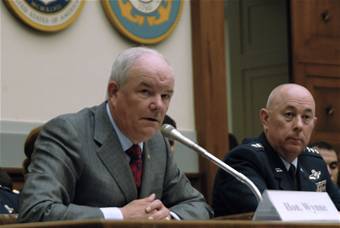Secre tary of Defense Robert Gates accepted the resignation of Air Force Secretary Michael Wynne and Gen. Michael Moseley, Chief of Staff, on June 5. Speaking to reporters at the Pentagon that same day, Gates said he believed that a change in leadership was needed “to bring in a new perspective and especially to underscore the issue of accountability.” Gates faulted USAF’s leadership pair for a “lack of effective oversight” in the service’s stewardship of nuclear weapons, “perhaps its most sensitive mission.” Indeed, he said, these declining standards were epitomized by the errant transfer of nuclear cruise missiles aboard a B-52 bomber last August and the mistaken shipment of Minuteman III ICBM missile components to Taiwan that came to light in March. Gates said these shortcomings “required strong action” on his part. The Taiwan incident “clearly was the trigger,” Gates said, in accepting the resignations. “I think it . . . prompted me to believe that there were serious systemic problems here” that went “well beyond” the B-52 incident. Gates said he consulted with President George Bush and Joint Chiefs of Staff Chairman Adm. Michael Mullen on this action. He thanked Wynne and Moseley for their service, saying “they both deserve our gratitude.” He said he would recommend a new CSAF and service secretary shortly. Wynne issued a statement June 5, saying it has been “an honor and pleasure” to lead the service and its airmen “while working side-by-side with Gen. Moseley.” However, he said. “recent events convince me that it is now time for a new leader to take the stick and for me to move on.” Moseley, in his June 5 resignation announcement, said, “Recent events have highlighted a loss of focus on certain critical matters within the Air Force.” As USAF’s senior uniformed leader, “I take full responsibility for events which have hurt the Air Force’s reputation or raised a question of every Airman’s commitment to our core values,” he said. “I think the honorable thing to do is to step aside.”
tary of Defense Robert Gates accepted the resignation of Air Force Secretary Michael Wynne and Gen. Michael Moseley, Chief of Staff, on June 5. Speaking to reporters at the Pentagon that same day, Gates said he believed that a change in leadership was needed “to bring in a new perspective and especially to underscore the issue of accountability.” Gates faulted USAF’s leadership pair for a “lack of effective oversight” in the service’s stewardship of nuclear weapons, “perhaps its most sensitive mission.” Indeed, he said, these declining standards were epitomized by the errant transfer of nuclear cruise missiles aboard a B-52 bomber last August and the mistaken shipment of Minuteman III ICBM missile components to Taiwan that came to light in March. Gates said these shortcomings “required strong action” on his part. The Taiwan incident “clearly was the trigger,” Gates said, in accepting the resignations. “I think it . . . prompted me to believe that there were serious systemic problems here” that went “well beyond” the B-52 incident. Gates said he consulted with President George Bush and Joint Chiefs of Staff Chairman Adm. Michael Mullen on this action. He thanked Wynne and Moseley for their service, saying “they both deserve our gratitude.” He said he would recommend a new CSAF and service secretary shortly. Wynne issued a statement June 5, saying it has been “an honor and pleasure” to lead the service and its airmen “while working side-by-side with Gen. Moseley.” However, he said. “recent events convince me that it is now time for a new leader to take the stick and for me to move on.” Moseley, in his June 5 resignation announcement, said, “Recent events have highlighted a loss of focus on certain critical matters within the Air Force.” As USAF’s senior uniformed leader, “I take full responsibility for events which have hurt the Air Force’s reputation or raised a question of every Airman’s commitment to our core values,” he said. “I think the honorable thing to do is to step aside.”
The rate of building B-21 bombers would speed up if the fiscal 2026 defense budget passes. But it remains unclear how much capacity would be added, and whether the Air Force would simply build the bombers faster, or buy more.
